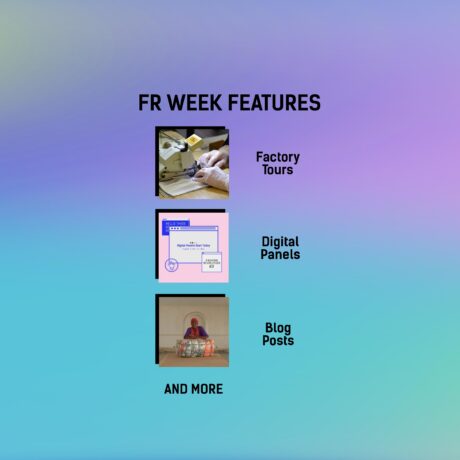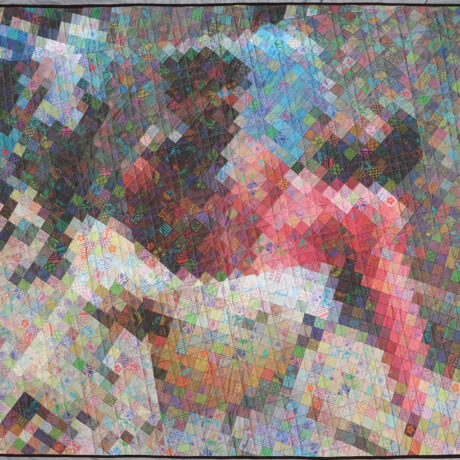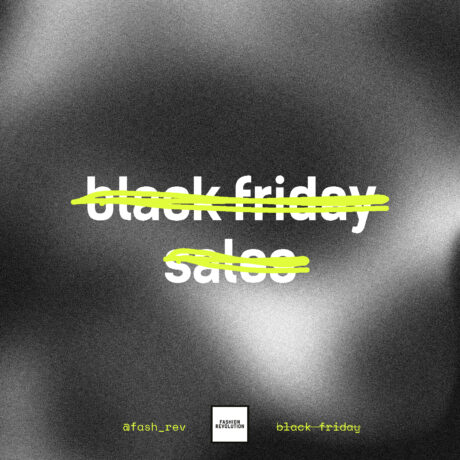FR USA: The Best of Fashion Revolution Week 2020
This year, the USA team focused our efforts on bringing fashion revolutionaries all over the world together with an amazing group of speakers and key change makers that shed light on the topics that matter to us all, including materials, policy, supply chain, labor rights, environmental issues and crafts just to name a few. We also remembered the 8th anniversary of the Rana Plaza collapse which occurred on April 24, 2013, the reason the fashion revolution started, and why we continue to fight for a fair, clean, safe and transparent fashion system. This year´s theme and events aimed to deliver actionable solutions around consumption, composition, conditions and collective action to change the fashion industry to one that conserves and restores the environment and values people over growth and profit. Here is a recap of all the digital events we hosted this year. Read more below!
Courageous Craftivism Digital Workshop: It takes courage to cut into a garment and give it a new life, but Bridgett Artise of Born Again Vintage guides viewers step by step through taking a basic men shirt and creating a fresh high neck look. She talked with FR USA’s Ashleyn Przedwiecki on her favorite up-cycled creations, as well as how to use to use fashion and your voice to courageously speak your values.
WhatsInMyClothes Digital Workshop with Tara St. James: Sustainable Textile expert, Tara St James led an educational workshop about #WhatsInMyClothes featuring items from her very own closet discussing the importance of organic cotton, not buying blended materials and the impact polyester has on the planet. She delved into denim and biodegradable nylon further with the help of The New Denim Project and MTI New York.
Organic Cotton and the future of textiles Instagram Live Q&A with Marci Zaroff: In honor of Fashion Revolution’s new campaign #WhatsInMyClothes, FR USA’s Ashleyn Przedwiecki dove into conversation with Marci Zaroff, an internationally recognized ECOlifestyle visionary, authority, innovator and educator. As a pioneer in the industry, Marci coined the term “Ecofashion” in 1995, and has been instrumental in driving authentic, environmental leadership & social justice worldwide for nearly three decades. This live Q+A covered hot topics around fibers, organic vs. conventional cotton, recycled PET, and the overall composition of our textiles and why it matters. Marci went deeper on how fashion can play a role in the health of farmers and soil, as well as the power of regenerative agriculture. While food and fashion have many overlapping elements, Marci educates on the certifications that matter most for fashion and what consumers can look for to support these more regenerative fashion iniatives.
Mask Making Digital Workshop with Mimi Miller: Washington DC based ethical designer Mimi Miller led a tutorial on how to make non medical face mask for personal use with deadstock fabric, any left over fabric or old clothes. She also took us on a tour of her improvised home studio, a studio she set up after the confinement in her apartnment.
Natural Dye Digital Workshop: An-Phuong Ly, a natural dyer based in Washington DC and the founder of An Made This led a natural dye workshop with Kathy Hattori, president of Botanical Colors. The two natural dyers introduced briefly the subject before diving into the workshop, explaining to the audience how to be resourceful with gathering dye supplies using what you have at home like an old garment that needs to be revived, a pot, a dye rack, tongs/stirring stick etc. They also gave an overview of different types of dyestuffs like kitchen compost such as onion skins, black tea, pomegranate skins, citrus peels, avocado skins/pits, coffee grounds, things that can be foraged around your house: dandelions, nettles, daffodils, black tea which is high in tannins or even rusty nails. While Kathy was answering questions from the audience adding insights to the dying process, An went on to dye a white t-shirt usinig onion skins. The white t-shirt was turned into a vibrant rusted yellow color.
How to Care for Your Clothes Digital Workshop with Alyson Jon Life: Designer and educator, Alyson Toone, led a workshop focused on how to properly care for your clothes (#LovedClothesLast). Besides stain lifting tricks and techniques she also taught us that just because a label says “Dry Clean Only” you can often save the expense and toxic chemicals by hand washing at home.
Sustainable Styling Digital Workshop with Taryn Hipwell: Founder of LA Beyond the Label, Taryn Hipwell, shared a look at how clothes can be styled with longevity and sustainability in mind. As we recosider our relationship with clothing, Taryn noted that there are great opportunities within upcycling, mending, and more that are at our fingertips to bring new life (and style!) to the items we already own.
Global Fashion Exchange Instagram Live Q&A: FR USA’s Shannon Welch spoke with the ever uplifting and extremly informative, Patrick Duffy, about the “new normal” we are all facing during this pandemic, the importance of changing the fashion industry model and the future of clothes swapping with a focus on consumption. Patick also announced the launch of digital swapping platform Swap Chain and walked listeners through how it works.
Aditi Mayer and Shannon Welch Instagram Live Q&A on Activism: On the 50th anniversary of Earth Day, FR USA’s Shannon Welch was honored to speak with leading sustainable fashion spokesperson Aditi Mayer, an activist for an inclusive and intersectional revolutionary movement in the fashion industry. The discussion started with the environmental impacts of apparel production and the connection between COVID-19 and climate change. Aditi then led viewers down a revealing path of how the current fashion industry continues to follow the colonial powers of the past and how the system must be decolonized.
Mission Mag and FR USA Instagram Live talk: Karina Givargisoff, the founder and editor-in-chief of Mission Magazine, the world’s first fashion philanthropic media brand, talked with FR USA’s Shannon Welch about building diverse and inclusive communities across platforms and IRL. Karina also touched upon future issues of the magazine and her desire to focus on mental health as the abuses of the industry she has worked in for over 20 years continue. In this light, she would like to share the struggles many people within and beyond the industry have faced and how mental health is an issue spaning every industry.
Fashion´s Plastic Problem Digital Panel: Focusing in on our #WhatsInMyClothes campaign, FR USA’s Nicholas Brown spoke with sustainability and communication strategist, Rachel Lincoln Sarnoff on tackling Fashion’s Plastic Problem. The key takeaway was we have to reframe our understanding of synthetic fabrics with what they really are: plastic. Today, 60% of fabrics are made from polyester — and this number has doubled since 2000. n light of this, Rachel advocated for using existing technology — like washing machine filters — to reduce the amount of plastic microfibers that are coming off of our clothes. Another issue brought up in conversation was clothing marketed as waterproof, stain proof, wrinkle resistant, wrinkle free — typically, these are treated with (perfluoroalkyl) PFAS chemicals (also found in Teflon pans). These are in a class called “forever chemicals” because they persist in the environment, along with being linked to human health reprocussions. Rachel advised to avoid them like the plague that they are!
Modern Slavery in the Garment Industry: In line with the “conditions” theme for Fashion Revolution Week, FR USA’s Sonia Kovacevic spoke to modern slavery abolitionist Grace Forrest. Grace has dedicated the past decade to advocating for human rights and is the founder of Walk Free, who is responsible for publishing the the Global Slavery Index. Sharing her passion and knowledge, Grace shared with us insights about the state of modern slavey around the world, particularly focusing on the garment industry, as well as how this issue is often overlooked, infiltrating throughout the supply chain. While it is a multi-faceted and complex issue that often resides with driving systematic change on a business and governmental level, Grace shared that one of the most powerful things an individual can do is demand brands answer #WhoMadeMyClothes?
PPE Production Digital Panel Addressing the Supply Chain: Members of the ethical fashion community discussed how the fashion & garment industry came together to create much needed personal protective equipment for healthcare and essential workers amidst our new reality. But they also exposed the labor issues that are happening in the US supply chain, specifically in New York City. Skilled Laborers Brigade and Custom Collaborative, whose representatives Shannon O’Hara and Ngozi Okaro were panelists, have been finding that contracts for PPE production are requesting prices to be as low at $0.30/mask! The panel enlightened many to the ongoing race to the bottom for prices that are happening during a time when people’s well-being should be of the upmost importance.
Changing Face of Fashion Digital Panel: Fashion professionals are seeing light at the end of this very long tunnel. Answering to the questions of where internships, jobs, career paths will land after the COVID-19 crisis are top of mind for many fashion students. This panel shed light on how fashion houses have pivoted their production and ways production may bring in new career options within the industry. Moderated by a Morary Ugwu of Simmons University in Boston, MA, concerns and answers where shared and new ideas of scholarships, internships and netowrking for marketing needs were established.
From Soil to Skin: What’s in Your Clothes Digital Panel: When we ask #WhatsInMyClothes, we also open the door to learning more about where fibers come from, and what resources and people are involved in making them. Cindy Harris of Windy Hill Alpaca and Katherine Tucker of Desert Churros Navajo Sheep joined Lesley Roberts of Southern California Fibershed to talk about the animals and fibers in local textile ecosystems involved in this process. A quick slide show outlining the breadth of available fiber, and using the SoCal ecosystem as a model of what’s possible, introduced a lively conversation that took us to two online tours starring our furry farm friends, then ended in a healthy dialogue between farmers and audience.
From Regenerative Farming To Reuse Digital Panel: Approaches To Fashion & Environmental Challenges: In a panel moderated by Waste Watch Co-Founders Bonnie Wright and Georgia Stockwell, the founders of Swap Society, Christy Dawn, and Atelier & Repair shared their perspectives on disposable culture and how their business models challenge consumption-as-usual, their different approaches to circular fashion, and how the current pandemic has affected their business approaches. From regenerating natural systems, designing out waste and pollution, and keeping products and materials in use, these founders are working to create a culture of clothes keeping and caring.
#IMadeYourClothes: Made in America Screening & Garment Workers Center Panel: In line with our themes of Collective Action and Conditions we closed the week with a screening of Remake’s “Made in America” documentary, a film that goes behind the scenes of garment factories in the US. Following the film, Alyssa Hardy, Senior News Editor of InStyle.com, moderated a powerful discussion with Marissa Nuncio, Director of Garment Workers Center and Ayesha Barenblat, Founder of Remake where we learned about the challenges facing the garment makers both locally and abroad that have been exacerbated by the current pandemic. We also heard a first hand account from Santa Puac, a garment maker in Los Angeles, who worked for a large fast fashion brand. She described the poor working conditions and discussed the piece rate system, which allowed the workers to be taken advantage of by working 50+ hour per week while only earning a fraction of the minimum wage.
FR Week Digital Factory Tours: FR USA goes #BehindtheSeams with three US-based garment manufacturers to get an inside look into how have flipped their ethical fahsion production to facemasks and gowns to support medical workers and professionals during cornavirus pandemic. In these IGTV videos, founders of factories across the US including Lefty Production co. (LA), Portland Garment Factory (OR), Accurate Services (Mass) shared a tour of their spaces and their hopes for the future of fashion production.
We Wear Fair Trade Panel: For the second year, the We Wear Fair Trade campaign launched during Fashion Revolution Week to commemorate the fatal collapse of the Rana Plaza Factory in Bangladesh. Fashion Revolution USA was happy to support their initiative by hosting a digital panel on April 28th entitled, “Personal Activism’s Impact on the Future of Fashion”. Panelists included female advocates featured in this year’s She Wears Fair Trade campaign, who are outspoken proponents for ethical, transparent, and sustainable fashion. Rachael Wang, Dominique Drakeford and Nikki Sanchez’s were chosen to be a part of the campaign because their work helps shed light on the lives impacted by garment purchases and the impact that’s possible through Fair Trade Certified™ factory-made clothing. Together with Fair Trade USA’s Amy Blyth they spoke about the importance of speaking their truth, supporting marginalized communities and the impact collective action can have on the future of fashion. The discussion was moderated by journalist, Esha Chhabra who has contributed to Forbes, San Francisco Chronicle, The New York Times, The Atlantic, The Economist, and The Guardian
You may watch the panel discussion here.








